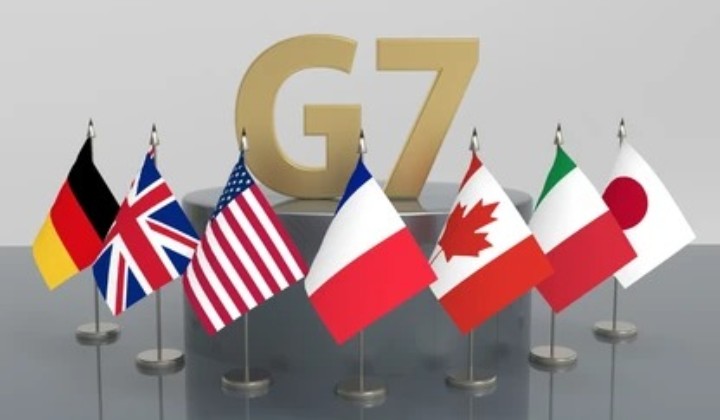Introduction for the G7Group
The G7, also known as the Group of Seven, is a coalition of some of the world’s largest advanced economies, including the United States, Canada, Japan, Germany, the United Kingdom, France, and Italy. The group was formed in the mid-1970s as a forum for discussions among industrialized democracies with similar economic systems and shared values.
Since its inception, the G7 has expanded its focus beyond economic issues to include a range of global challenges, such as climate change, global health, and geopolitical concerns. The group’s decisions can have significant impacts on global policies, and its members often use the platform to advocate for their own national interests.
The G7 has faced criticism for being exclusive and not representative of the broader global community. However, its members see it as an important forum for addressing global challenges and promoting cooperation among some of the world’s most influential nations. As the world continues to face significant economic, social, and environmental challenges, the role of the G7 in shaping international policies is likely to remain crucial.
What is the purpose of the G7Group ?
The purpose of the G7 (Group of Seven) is to bring together some of the world’s largest advanced economies to address global economic issues and coordinate economic policies. The group was formed in the mid-1970s as a forum for discussions among industrialized democracies with similar economic systems and shared values.
The G7 aims to promote economic growth and stability, address international trade issues, and coordinate policies related to global financial stability. The group also discusses other issues of global significance, such as climate change, geopolitical concerns, and global health challenges.
The G7’s primary objective is to strengthen cooperation among its member nations, promote consensus on international policies, and encourage economic growth and development worldwide. While the group has faced criticism for being exclusive and not representative of the broader global community, its members see it as an important forum for addressing global challenges and promoting cooperation among some of the world’s most influential nations.
What is the history of the G7?
The Group of Seven, commonly known as G7, is a group of seven of the world’s most advanced economies. The group was founded in 1975, when the leaders of France, Germany, Italy, Japan, the United Kingdom, and the United States met for an economic summit in Rambouillet, France. Canada joined the group the following year, making it the G7.
Initially, the group was created as an informal forum for leaders of advanced economies to discuss issues of mutual interest, such as trade, finance, and economic cooperation. Over time, the group’s focus has expanded to include issues such as energy, the environment, global security, and development.
The G7 countries are all members of the United Nations, the World Bank, and the International Monetary Fund, and they account for approximately 58% of the global net wealth. The group represents some of the world’s most powerful economies and plays a significant role in shaping international economic policy.
Over the years, the G7 has gone through several changes in membership and composition. In 1997, Russia was added to the group, creating the G8, but it was excluded in 2014 following its annexation of Crimea. The group’s members are now the United States, Canada, the United Kingdom, Germany, France, Italy, and Japan.
Despite its informal nature, the G7 has had a significant impact on global economic policy. The group has been instrumental in promoting free trade, reducing barriers to investment, and coordinating efforts to address global economic challenges such as the financial crisis of 2008-2009.
What are the outcomes of G7 Summits?
The outcomes of G7 Summits vary depending on the specific issues discussed at each meeting. Generally, the leaders of the G7 countries use these meetings to discuss global challenges, such as economic growth, climate change, security, and trade. Here are some examples of outcomes from past G7 Summits:
- Economic Cooperation: The G7 has helped coordinate economic policies among member countries, promoting free trade and reducing trade barriers. The group has also provided financial assistance to countries in need, such as during the 1997 Asian financial crisis and the 2008 global financial crisis.
- Climate Change: The G7 has played a significant role in addressing climate change. In 2015, the group committed to reducing greenhouse gas emissions and limiting global warming to below 2 degrees Celsius. The G7 has also provided financial and technical assistance to developing countries to help them address climate change.
- Global Health: The G7 has addressed global health issues, such as the Ebola outbreak in West Africa in 2014. The group provided funding and resources to help control the outbreak and prevent it from spreading further.
- Security: The G7 has also focused on global security issues, such as counterterrorism efforts and the crisis in Ukraine. The group has coordinated efforts to combat terrorism and has provided financial assistance to Ukraine to help stabilize its economy.
- Women’s Empowerment: The G7 has also addressed issues related to gender equality and women’s empowerment. In 2019, the group announced a $3 billion investment in girls’ education in developing countries.
In addition to these specific outcomes, G7 Summits provide a forum for leaders to discuss global challenges and work towards solutions. The meetings also help to promote cooperation and understanding among member countries.
Geo-political meaning of G7 Group Formation-
The formation of the G7 group has important geopolitical implications. The group represents some of the world’s most advanced economies and powerful nations, with significant influence in global politics and economics. The G7 has been described as a “club of the rich and powerful,” and its formation reflects the shift towards a multipolar world order.
The formation of the G7 was driven by the desire of Western industrialized countries to coordinate their economic policies and promote free trade. However, the group’s influence extends beyond economic issues. The G7 has been involved in addressing global challenges such as climate change, security, and development, which have significant geopolitical implications.
The G7 is often seen as a counterbalance to other geopolitical groupings, such as the G20, which includes both developed and developing countries. The G7’s exclusive membership reflects a historical concentration of economic and political power in the Western world, but this has been criticized as being unrepresentative of the global population.
Overall, the formation of the G7 reflects the geopolitical realities of the post-World War II world and the increasing importance of economic cooperation and coordination in global affairs. However, the group’s exclusivity and concentration of power have also been criticized as potentially reinforcing inequalities and marginalizing other countries and regions.
G7 Group vs other group of countries –
The G7 is one of several groups of countries that exist to address global issues and promote cooperation among member nations. Here are some of the key differences between the G7 and other groups of countries:
- -G20: The G20 is a larger group of countries that includes the G7 nations as well as several emerging economies such as China, India, and Brazil. The G20 was formed in the late 1990s to promote cooperation among countries in the aftermath of the Asian financial crisis. The G20 has a broader mandate than the G7, with a focus on economic issues, financial regulation, and international development.
- -BRICS: BRICS is a group of five major emerging economies: Brazil, Russia, India, China, and South Africa. The BRICS nations are seen as rising powers in the global economy and are working to increase their influence in global affairs. Unlike the G7, which is composed of wealthy industrialized nations, BRICS is made up of developing countries that are seeking greater representation in global decision-making.
- -ASEAN: The Association of Southeast Asian Nations (ASEAN) is a regional organization composed of ten countries in Southeast Asia. ASEAN promotes economic integration and cooperation among member nations and has become an important player in regional affairs. While ASEAN is not a global organization like the G7, it represents a significant bloc of countries with growing economic and political influence.
In summary, the G7 is a group of wealthy industrialized nations that focus on global economic issues and other challenges, while other groups such as the G20, BRICS, and ASEAN have different compositions and mandates. Each group of countries has its own strengths and weaknesses and plays a unique role in shaping the global landscape.
What is the key features of G7 GROUP
The key features of the G7 group include:
- Economic Power: The G7 countries are among the world’s most advanced economies, with significant economic power and influence in global markets.
- Informal Nature: The G7 is an informal group, meaning that it has no formal constitution, secretariat, or legal authority. Decisions are made through consensus and are not legally binding.
- Limited Membership: The G7 is a small group, consisting of seven countries: Canada, France, Germany, Italy, Japan, the United Kingdom, and the United States.
- High-Level Meetings: The G7 leaders meet annually at a summit to discuss a wide range of issues, including the global economy, security, trade, and climate change.
- Global Reach: While the G7 is a Western-dominated group, it has global reach and plays an important role in shaping international economic policy.
- Influence: The G7 countries collectively hold significant influence in the international community, as they are members of key international organizations such as the United Nations, the World Bank, and the International Monetary Fund.
- Focus on Cooperation: The G7’s primary focus is on cooperation and coordination among its members to address global challenges, promote economic growth, and reduce inequality.
Overall, the G7 is a small but influential group that has played an important role in shaping global economic policy and addressing some of the world’s most pressing challenges.
Controversies over G7 Group
The G7 group has been the subject of several controversies over the years. Here are some examples:
- Exclusivity: One of the main criticisms of the G7 is its exclusivity. The group is composed of wealthy industrialized nations, and many argue that it does not represent the interests of the broader global community.
- Lack of Diversity: The G7 has been criticized for its lack of diversity, with all members coming from the Global North. This has led to accusations of imperialism and a lack of representation for developing nations.
- Limited Effectiveness: Despite its economic power and influence, the G7 has been criticized for its limited effectiveness in addressing global challenges. Critics argue that the group has failed to deliver on its promises and lacks the political will to enact meaningful change.
- Disagreements Among Members: The G7 has also been plagued by disagreements among its members on various issues, including trade, climate change, and security. These disagreements have sometimes led to diplomatic tensions and limited the group’s effectiveness.
- Legitimacy: The G7’s legitimacy has been questioned by some, with critics arguing that the group lacks the democratic legitimacy that comes with being a formal international organization.
Overall, the controversies surrounding the G7 reflect broader debates about the nature of global governance and the role of wealthy industrialized nations in shaping international policy. While the group has played an important role in shaping global economic policy, its exclusivity and lack of diversity have led to criticism and calls for reform.
Critical Analysis of G7 Group-
The G7 group has been a significant player in global economic governance for several decades. However, its role and effectiveness have been subject to much criticism and debate.
One of the key criticisms of the G7 is its exclusivity. The group consists of wealthy industrialized nations, which has led to accusations of elitism and a lack of representation for developing countries. Critics argue that the G7’s dominance in global economic governance has contributed to a concentration of power and a failure to address the needs of the broader global community.
Another criticism of the G7 is its limited effectiveness. While the group has been instrumental in shaping global economic policy, it has been criticized for failing to deliver on its promises and for lacking the political will to enact meaningful change. Disagreements among its members on various issues, including trade, climate change, and security, have further limited the G7’s effectiveness.
The G7 has also been accused of perpetuating inequalities and reinforcing the dominance of the Western world. Its focus on free trade and neoliberal economic policies has been criticized for exacerbating global economic disparities and increasing the power of multinational corporations at the expense of workers and the environment.
Despite these criticisms, the G7 remains a significant player in global economic governance, and its annual summits continue to shape the international economic agenda. However, its role and effectiveness are increasingly being questioned, and calls for reform and greater inclusivity are growing.
In the G7 group is a complex institution with both positive and negative aspects. While it has played an important role in shaping global economic policy, its exclusivity, limited effectiveness, and perpetuation of inequalities are significant criticisms that must be addressed if the group is to remain a relevant and legitimate player in global economic governance.
Conclusion for the G7Group
The G7, also known as the Group of Seven, is a coalition of some of the world’s largest advanced economies, including the United States, Canada, Japan, Germany, the United Kingdom, France, and Italy. The group was formed in the mid-1970s to address global economic issues and coordinate economic policies.
Over the years, the G7 has tackled a range of issues, including economic growth and stability, international trade, climate change, and geopolitical concerns. The group has also played a key role in responding to global crises, such as the COVID-19 pandemic.
While the G7 has faced criticism for being exclusive and not representative of the broader global community, it remains an important forum for discussions among some of the world’s most influential nations. The group’s decisions can have significant impacts on global policies, and its members often use the platform to advocate for their own national interests.
In recent years, the G7 has expanded its focus to include issues such as gender equality, education, and global health. As the world continues to face significant challenges, the G7’s role in shaping international policies and promoting cooperation among nations is likely to remain crucial.



